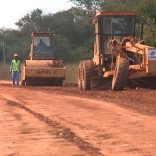Mozambique paid US$40.37 million in interest on 'hidden debt' Eurobonds up to March
Mozambique: Rating can rise only with improvement in debt management – Fitch

File photo: Lusa
Financial ratings agency Fitch Ratings said on Thursday that further improvements and confidence in the management of Mozambique’s public finances are needed before the view on sovereign credit quality can improve.
“Developments in the hydrocarbon sector and reforms with the International Monetary Fund (IMF) seal of approval are important, and there has been more external financing, but the momentum is less positive than in Angola because [the fruits] are more for the future,” said the Head of Middle East and African Sovereigns at Fitch Ratings.
In a webinar on the evolution of African economies,Toby Iles pointed to the “volatility in the domestic debt market” and added that “this is a question of management, more than liquidity,” stressing, “We want to have more confidence in that before we change Mozambique’s rating.”
In November last year, Lusa reported that Mozambique was paying late on some domestic treasury bond coupons.
“Market participants report occasional delays in the payment of the coupons,” said Álvaro Piris, head of the IMF mission in Mozambique, when asked about the delay of around two weeks in the payment of coupons on 14 November last year.
Fitch in February maintained its ‘CCC+’ rating for sovereign debt issued by Mozambique, noting that maintaining the opinion below investment grade, and just one step above financial default, “reflects the government’s high debt levels, large budget deficits, unresolved public company debt problems, low ‘per capita’ GDP, weak governance indicators and a challenging security situation.”
READ: Fitch affirms Mozambique at ‘CCC+’
Fitch Ratings, owned by the same owners of consultancy Fitch Solutions, analyses 22 countries in Africa, 19 of which are in sub-Saharan Africa, and of these, almost half, or 45%, have a CCC rating or are in financial default, which highlights the “significant levels of credit risk in the region”.
At today’s conference, the analysts stressed that although 2023 is not a very heavy year in terms of sovereign debt maturity, the next two years will be difficult for a good part of the countries, which face the end of the term of the loans, and will therefore have to pay back in full what they have borrowed or issued in the international financial markets.
“In 2024 there will be more financial pressure on countries, with Kenya, Egypt and Ethiopia having to pay back more than $2 billion each, and 2025 will be even more difficult, with several countries facing debt maturity,” the analyst warned.
Asked how African countries are coping with rising interest rates and the impacts of rising oil prices and inflation, notably food prices, Toby Iles stressed the importance of fiscal consolidation.
“Fiscal consolidation is crucial, they are trying to unlock the mechanisms to increase domestic revenue mobilisation, which is very difficult historically, and they are more focused on managing public finances while trying to maintain and even accelerate economic growth,” he said, stressing that “the other option is restructuring” debt.












Leave a Reply
Be the First to Comment!
You must be logged in to post a comment.
You must be logged in to post a comment.